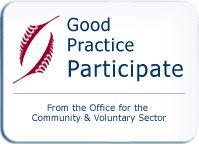
Recommended by Tom Atlee
Specialised participatory methods
Various specialised techniques have been developed to encourage public involvement in decision-making processes.

10 November 2009 [Happy Birthday, Marines]
Though it may seem an unlikely location to happen upon a conference on astrobiology, the Vatican recently held a “study week” of over 30 astronomers, biologists, geologists and religious leaders to discuss the question of the existence of extraterrestrials. This follows the statement made last year by the Pope's chief astronomer, Father Gabriel Funes, that the existence of extraterrestrials does not preclude a belief in God, and that it's a question to be explored by the Catholic Church. The event, put on by the Pontifical Academy of Sciences, took place at the Casina Pio IV on the Vatican grounds from November 6-11. . . . . . . .
“Just like there is an abundance of creatures on earth, there could also be other beings, even intelligent ones, that were created by God. That doesn't contradict our faith, because we cannot put boundaries to God's creative freedom. As saint Francis would say, when we consider the earthly creatures to be our “brothers and sisters”, why couldn't we also talk about a “extraterrestrial brother”? He would still be part of creation.”
.
In the aftermath of violence, lists suggest the benefits of collaboration
By Megan Garber
In the immediate aftermath of the shootings, news outlets from The New York Times to The Huffington Post to The Today Show created lists that aggregated the Twitter feeds of, among others, national breaking-news sources (CNN, the AP), official sources (the U.S. Army, the Red Cross, the office of Texas governor Rick Perry), local news organizations, and local individuals.
Twitter lists were tempering conjecture with the wisdom-of-crowds brand of mediation that is built into their multi-channel approach.
“The Internet” is, in its way, a one-stop news shop; and through, in particular, the deceptively simple innovation that is the hyperlink, news outlets are increasingly defined by connection rather than separation. (Thus, the “Web.”) And that, in turn—fundamentally, if not completely—topples the competitive underpinnings of newsgathering as a profession. Do what you do best, and link to the rest.

The International Consortium of Investigative Journalists (ICIJ) is a collaboration of some of the world's top investigative reporters. Launched in 1997 as a project of the Center for Public Integrity, ICIJ globally extends the Center's style of watchdog journalism, working with 100 journalists in 50 countries to produce long-term, transnational investigations.
 Tobacco Underground
Tobacco UndergroundThe illicit trafficking of tobacco is a multibillion-dollar business today, fueling organized crime and corruption, robbing governments of needed tax money, and spurring addiction to a deadly product. Drawn by profits rivaling those of narcotics, smugglers move cigarettes by the billion, making tobacco the world's most widely smuggled legal substance.
 Collateral Damage
Collateral DamagePost-9/11 U.S. foreign policy and military aid and assistance had a huge impact in nations around the world — and at home. This award-winning project includes 20 articles from four continents.
 Divine Intervention, U.S. AIDS Policy Abroad
Divine Intervention, U.S. AIDS Policy AbroadA year-long investigation of President Bush’s initiative to fight AIDS abroad finds that conservative ideology hinders its real benefits by insisting on abstinence-only programs over promoting condom use.
 Windfalls of War, U.S. Contractors in Afghanistan & Iraq
Windfalls of War, U.S. Contractors in Afghanistan & IraqA comprehensive examination of companies that won contracts for work in Iraq and Afghanistan — and of their campaign contributions, led by General Electric and Vinnell Corporation (the former Northrup Grumman).

Starting in July 2009, the International Consortium of Investigative Journalists fielded a multinational team of reporters to uncover the special interests attempting to influence negotiations leading to the pivotal December talks on a climate change treaty in  Copenhagen. The project built upon the Center’s previous reporting in Washington on efforts to influence the U.S. Congress in The Climate Change Lobby. The ICIJ team involved reporters in eight of the major economies deemed essential to a successful treaty: Australia, Brazil, Canada, China, the European Union, India, Japan, and the United States.
Copenhagen. The project built upon the Center’s previous reporting in Washington on efforts to influence the U.S. Congress in The Climate Change Lobby. The ICIJ team involved reporters in eight of the major economies deemed essential to a successful treaty: Australia, Brazil, Canada, China, the European Union, India, Japan, and the United States.
November 04, 2009, 11:01 pm
Washington — Toward a Stalemate in Copenhagen
Phi Beta Iota: Governments are incompetent at global Earth Intelligence (although the Earth Science Initiative under Bush-Cheney showed real promise), and corporations lie. It is not helpful to have the International Panel on Climate Change (IPCC) and the Honorable Al Gore also play very loosely with the truth. The one public interest solution, and one alone that will enable humanity to achieve conscious evolution: creation of a World Brain with an embedded EarthGame.

Not New, But Improved
Allison Arieff
Meet Stella.
At first glance, this little yellow giraffe looks like a lot of other kids’ bath toys. But Stella is made from Renuva, a little-known material that could change for the better the way hundreds of things, from upholstery to airplane wings, are made.
The story of how Stella came to be made from this material, a soy-based alternative to polyurethane (which is typically petroleum-based), provides a model for how stuff can be better designed in the future.
Phi Beta Iota: While folks focus on the Al Gore show and the important but isolated challenge of reducing our carbon footprint, the avant guarde is way down the road with sustainable design, green chemistry, zero waste, and so on. It's all connected, we need to get truth on the table, and we need to do the right things righter. Stella is a poster child for a new paradigm of ecological economics, natural capitalism, and conscious evolution. Learn more about Renuva from Dow below.


The Detritus of Katrina and the Paralysis of Fear:
A Metaphor for Contemporary Politics
The vast Mississippi Delta in Louisiana is sinking as sea water from the Gulf of Mexico seeps in to destroy its fresh water marshlands. The Army's Corps of Engineers says it can not protect New Orleans from the inevitable storm surges caused by hurricanes (see the Guardian report attached below).
Some may dismiss this warning as alarmist hype, and the Army's Corps of Engineers certainly does not have an enviable track record in this regard. That said, the Corps' warning does make evident the political-economic detritus left over from Hurricane Katrina. Inferentially, the warning also highlights the hollowness in the scare tactics used by global warming advocates to raise money for their far more costly ambitions, not to mention the paralyzing political-economic consequences posed by the politics of fear practiced by the Pentagon.
The reality of the Delta thus becomes a metaphor for the larger emptiness that now pervades American politics.
Below the Fold: Balance of Spinney Comment, Full Article with Highlight, Books
Continue reading “Journal: Chuck Spinney Sends–Katrina & Fear”